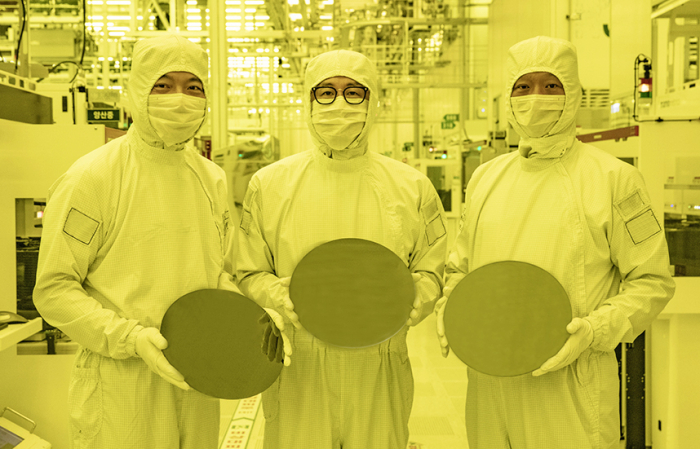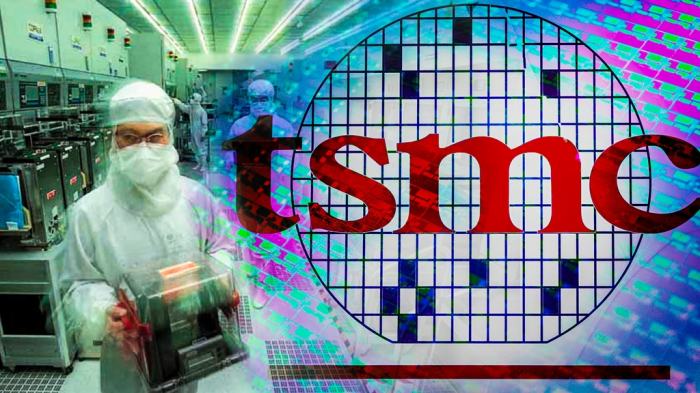Korean chipmakers
Samsung Elec to expand foundry business to tackle TSMC
The South Korean tech giant aims to more than double capacity of the mature and specialty nodes by 2027
By Oct 24, 2022 (Gmt+09:00)
3
Min read
Most Read
LG Chem to sell water filter business to Glenwood PE for $692 million


Kyobo Life poised to buy Japan’s SBI Group-owned savings bank


KT&G eyes overseas M&A after rejecting activist fund's offer


StockX in merger talks with Naver’s online reseller Kream


Mirae Asset to be named Korea Post’s core real estate fund operator



Samsung Electronics Co., the world’s second-largest foundry company, is set to expand production technology of chips for automobiles, sensors and other specialty products dominated by Taiwan Semiconductor Manufacturing Co. to take on the industry leader.
Samsung’s unit for contract chipmaking, or foundry, plans to increase its mature nodes and specialty nodes by more than 10 units by 2024, according to industry sources on Sunday. The South Korean tech giant’s production capacity of the mature and specialty nodes will rise by 2.3 times by 2027 from the level of 2018.
“It is a strategy to bite into a competitor’s market share by targeting its stronghold,” said an industry source in Seoul said. TSMC is dominating the global mature and specialty node industry with a market share of more than 50%.
The mature node is for older chip production technologies such as 10 nanometers (nm), 14 nm, 28 nm, 65 nm and 180 nm processes to be used in vehicles, consumer electronics components and other products that do not require state-of-the-art processes. The specialty node is the customized legacy node to meet customers’ requests. The mature and specialty nodes account for more than half of the global foundry business.
TECHNOLOGY DIDN'T HELP SAMSUNG EXPAND MARKET SHARE
Samsung has been focusing on the advanced node for ultra-small, high-performance and low-power semiconductors such as application processors in smartphones, as the latecomer tried to make up for its production capacity shortcomings with technology in its competition against TSMC.
The two tech behemoths have been in cut-throat competition in advanced chip production technology. They have been fiercely racing to become the world’s first company to launch mass production of the 5 nm and 3 nm processes.
But Samsung, the world’s top memory chipmaker, stayed far behind TSMC as the South Korean company accounted for only 16.5% of the global foundry market in the third quarter, less than a third TSMC’s market share of 53.4% as of the third quarter, according to research firm TrendForce.
The pioneer of the foundry industry has been leading the sector for the last 35 years by steadily unveiling high-technology process technologies.
TSMC dominated the global mature and specialty node sectors based on its overwhelming production capacity. The Taiwanese company is known to use more than half of its capacity of 28 million wafers a month for the legacy and specialty nodes.
The strategy to focus on those processes paid off as sales from them made up 46% of the company's total revenue in the July-September period.

ROSY OUTLOOK
Demand for the mature and specialty nodes remained strong as not all companies need the advanced node. NXP Semiconductors N.V., an automotive chipmaker, mainly uses the 28 nm process, for example, while Apple Inc. and Qualcomm Inc. seek cutting-edge technologies such as 7 nm, 5 nm and 4 nm processes.
The outlook for those legacy and specialty nodes is also bright. A vehicle currently needs about 200 semiconductors, but a self-driving car needs more than 2,000 chips, for example.
Samsung must beat TSMC in the sectors to become the top foundry maker by 2030.
The South Korean company plans to invest in the 8 nm process, which is used to produce automotive chips and radio-frequency (RF) chips, and raise its capacity by 1.5 times from the level of 2019.
For image sensors, it is poised to introduce a 17 nm process for premium products in addition to a 28 nm process.
“It will be key how many customers Samsung can take from TSMC in its goal to be No. 1,” said another industry source in Seoul.
Write to Jeong-Soo Hwang at hjs@hankyung.com
Jongwoo Cheon edited this article.
More to Read
-
 Korean chipmakersSamsung mulls new foundry plant in Europe, to expand outsourcing
Korean chipmakersSamsung mulls new foundry plant in Europe, to expand outsourcingOct 19, 2022 (Gmt+09:00)
3 Min read -
 Korean chipmakersSamsung to ramp up hiring for foundry business
Korean chipmakersSamsung to ramp up hiring for foundry businessJul 27, 2022 (Gmt+09:00)
2 Min read -
 Korean chipmakersSamsung's 3 nm chip narrows microchip gap with TSMC
Korean chipmakersSamsung's 3 nm chip narrows microchip gap with TSMCJun 30, 2022 (Gmt+09:00)
3 Min read -
 The KED ViewCan Samsung Electronics ever catch up to foundry leader TSMC?
The KED ViewCan Samsung Electronics ever catch up to foundry leader TSMC?May 03, 2022 (Gmt+09:00)
4 Min read -
 Korean chipmakersSamsung, TSMC in heated race for industry’s smallest 3 nm process node
Korean chipmakersSamsung, TSMC in heated race for industry’s smallest 3 nm process nodeAug 04, 2021 (Gmt+09:00)
4 Min read
Comment 0
LOG IN


